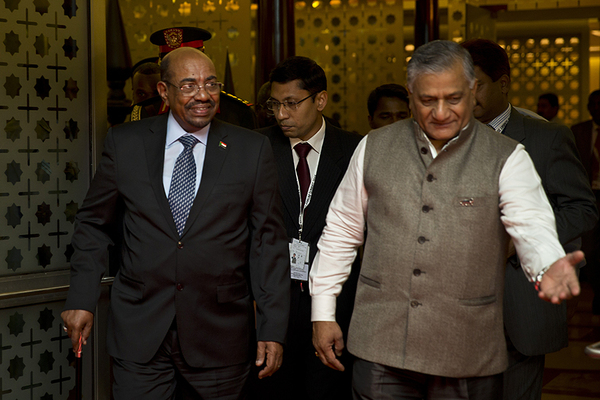Sudanese President Omar al-Bashir has landed in India and already he is causing a stir.
The controversial leader, indicted for genocide and war crimes by the International Criminal Court (ICC), is attending the India-Africa Summit in New Delhi this week where more than 40 African leaders will gather.
But the ICC says that India is obliged to arrest and hand over President Bashir. India is not a signatory to the ICC but the court is citing a UN Security Council resolution to restrict Mr. Bashir’s travel. So the case appears to pit India’s ambitious goals in Africa against its aspirations to be a larger global player.
“Although Indians and Africans comprise nearly 2.5 billion people, our nations continue to be excluded from appropriate representation in the institutions of global governance,” said India’s external affairs minister Sushma Swaraj said on Tuesday.
For more than six years, Bashir has dodged the ICC’s warrants for his arrest – most recently in South Africa – and remains an embarrassing example of the court’s failure to compel African states to comply with its laws.
India says officially that it will be “fully compliant with its international legal obligations” when asked about the arrest of Bashir. But the ICC’s demand also puts India in a peculiar position since it both risks $1.4 billion in trade and investment with Sudan and broader displeasure from many African states who view the ICC negatively for its role on the continent.
Since the ICC began pursuing cases in 2002, it has opened nine cases in eight countries – all of them in Africa – causing some African leaders to argue there is a bias, The Christian Science Monitor reports.
“There are people who have the power to use international justice or international law to judge others and it does not apply to them,” said Rwandan President Paul Kagame in 2013.
In 2013, the AU passed a resolution that no sitting African head of state should be tried before the ICC — a direct jab at the court’s warrants for the arrest of Kenya’s president Uhuru Kenyatta and his deputy William Ruto on charges of instigating violence in aftermath of the country’s 2007 election. The following year, the ICC officially withdrew its charges against Mr. Kenyatta.
A large blow to the ICC came in June when, during a visit to South Africa by Bashir for an AU conference, South African authorities defied a local court that barred him from leaving. South Africa, unlike India, is an ICC signatory. The failure to arrest Bashir has created a domestic legal quandary, forcing the ICC to consider if South Africa is in violation of the Rome Statute and deserving of censure by the UN Security Council.
It is doubtful that India, which seeks a Security Council seat, wants a similar problem.
India and Sudan, in fact, have had a long history. India was one of the first Asian countries to recognize Sudan and establish diplomatic relations with it. India is also the second largest exporter to Sudan after China, and some Indian oil, gas, and construction firms operate in Sudan.
The Sudanese leader is wanted on charges that include crimes against humanity in the country’s Darfur region. He has eluded the warrants since the first one was issued in 2009. ICC Prosecutor Fatou Bensouda says that India has an obligation to hand the leader over.
“By arresting and surrendering ICC suspects, India can contribute to the important goal of ending impunity for the world’s worst crimes,” she told reporters.
India’s interests in Africa are prominently displayed at the conference this week: A growing need for more energy and commodities has forced India to ramp up trade with Africa, which has grown 20 times since 2000, and doubled in the last five years to reach nearly $72 billion in 2014 making India a top-five Africa investor.
Summits like the one this week are not uncommon among countries that have interests in Africa. The United States for example hosted African leaders for the first time in 2014. And China, the Asian giant in Africa, will host its Sixth China-Africa Cooperation Forum in a few months.
India sees this summit – its third and largest – as an opportunity to increase trade and economic links that will put it in direct competition with China’s billions.



